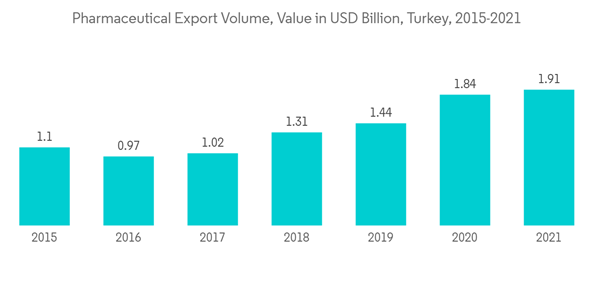Key Highlights
- The COVID-19 pandemic impacted the country's domestic and international courier express services due to restrictions and lockdowns. The industry is recovering by adjusting to the changing consumer behaviors during the pandemic. The logistic companies increased their online delivery capacities to meet the demand created during the pandemic.
- In 2022, the Turkish government launched the Transport Vision 2053 program to bolster the development of all modes of transport in the country. Under this 30-year plan, the country will invest more than USD 197 billion in rail, road, maritime, and air transport and communications. These investments are anticipated to contribute more than USD 1 trillion to GDP and USD 1.36 trillion to production. This plan mainly focuses on increasing rail cargo transportation from 5.08% in 2023 to 21.93% in 2053.
- Meanwhile, in January 2023, Chinese e-commerce giant Alibaba Group Holding Ltd planned to invest more than USD 1 billion in setting up a logistics hub at Istanbul Airport and a data center near the Turkish capital Ankara. In addition, the CEP market in the country is fueled by increasing e-commerce sales. In 2022, e-commerce trade volumes in the country witnessed a strong growth of 116% compared to the previous year. As per the Trade Ministry, from January to June 2022, online orders rose by 38% compared to the same period in 2021. Thus, the surging e-commerce sector is expected to drive Turkish courier, express, and parcel services.
Turkey Courier, Express, and Parcel Market Trends
Government Initiatives to Develop Logistics Infrastructure
In 2022, the Turkish government aimed to establish the country as a logistics superpower as part of its 2053 vision. Turkey is in the Europe-Asia-Africa trade triangle, which offers great opportunities for the country, especially in the field of transportation and logistics. In addition, to leverage this advantage, the country has already invested more than USD 172 billion in five main transportation sectors. The country is also investing in railway networks to boost rail cargo. In 2022, the railway network was expanded from 10,959 km to 13,022 km, which will be lengthened to 28,590 km by 2053.In 2022, the country planned to improve the road service level with new investments. It plans to expand the divided road network from 28,650 km to 38,000 km and the highway network from 3,633 km to 8,325 km by the end of 2053. In addition, the country is investing in infrastructure such as the Canal Istanbul project and increasing airports from 56 to 61 in the coming years to fuel the courier express services.
Meanwhile, in 2022, Turkey's Transport and Infrastructure Minister announced a Transport and Logistics Master Plan to achieve the country's transport and communication infrastructure targets, focusing on railways. In 2021, the country's rail freight transport volume witnessed a growth rate of 10% up to 33.6 million ton. Thus, the growing volume of rail cargo is drawing investors' attention toward the railway sector.
Growing Demand for Temperature-controlled Logistics
Turkey is one of the fastest-growing countries in the pharmaceutical industry. The country is also experiencing an exponential increase in the demand for chilled and frozen food. These factors, supported by the new infrastructure and expansion of existing companies into the country's eastern region, are aiding Turkey's cold chain market growth.The geographical position in the Mediterranean region allows the country to be an important link between the European and Asian continents. The increasing trade between these continents may directly affect the growth of the country's cold chain sector. The increasing number of supermarkets, foodservice establishments, and other outlets in the country are leading to the short-term growth of the sector, while the infrastructural development in the country may support the cold chain industry in the long run.
The Turkish pharmaceutical industry exports to nearly 180 destinations, and the country plans to emerge as a global pharmaceutical hub with a strong export network. According to the Pharmaceutical Manufacturers Association of Turkey (IEIS), the country owns 100 pharmaceutical and 11 raw material production plants, 680 companies, 33 R&D centers, and 40,000 employees, and the pharmaceutical industry produces more than 12,000 products annually. As per IEIS, in 2021, the country's pharmaceutical industry exported more than USD 1.9 billion in medicine, up by 4% compared to the previous year. Thus, the strong pharmaceutical industry in the country bolsters cold chain-related services.
Turkey Courier, Express, and Parcel Industry Overview
The report covers the major players operating in the Turkish CEP market. The market is highly competitive with a few players occupying a major share of the international CEP market. The market is fragmented and is expected to grow during the forecast. The major players in the Turkish CEP market are TNT International Express, CEVA Logistik, UPS, DSV, etc.Additional Benefits:
- The market estimate (ME) sheet in Excel format
- 3 months of analyst support
This product will be delivered within 2 business days.
Table of Contents
Companies Mentioned (Partial List)
A selection of companies mentioned in this report includes, but is not limited to:
- TNT International Express
- CEVA Logistik Limited
- UPS Hizli Kargo
- DSV
- DHL Worldwide Express
- Ekol Logistics
- ATA Freight Line Limited
- ASE ASYA Afrika Hizli Kargo
- Reysas Lojistik
- Turkon Logistic Group
- Asgard Transport & Logistics
- SkyNet Worldwide Express
- BL Global Lojistik*










